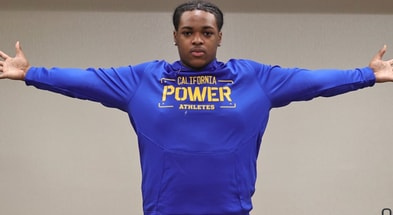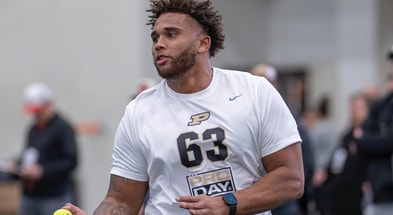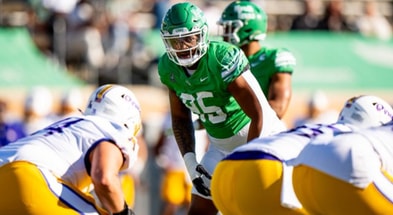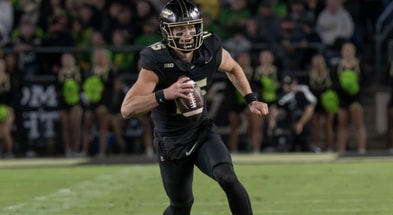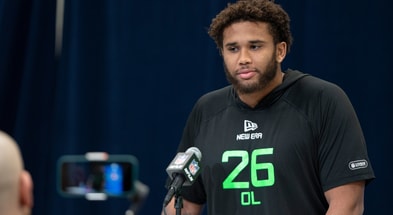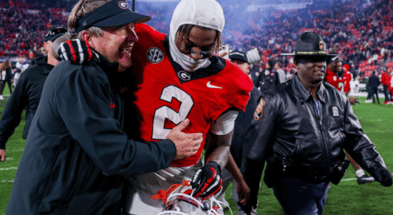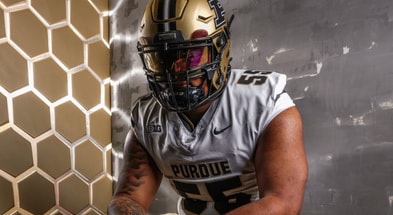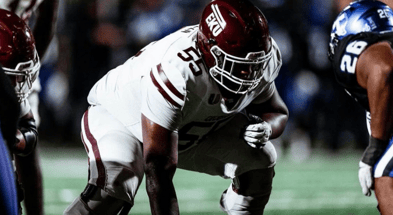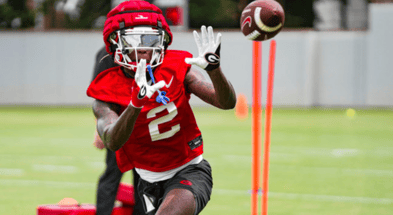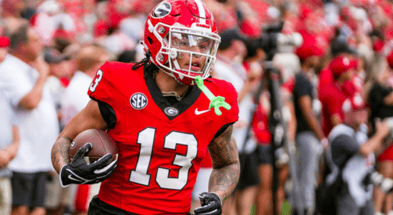The four defining moments of Ryan Walters' career

Ryan Walters has been a man on a mission. His goal: To become a head coach. He has arrived to his destination at 37. Is he ahead of schedule?

“At my first staff meeting, I’m like, ‘Man, I want to be a head coach,’ “ said Walters. “(Colorado head coach) Dan Hawkins is sitting at the head of the table. He’s making a million dollars a year doing this. ‘I can do this.’ That’s what I was thinking.”
That was 2009, when Walters was a student assistant working with the Colorado secondary. Now, 15 years later, Walters has taken a big bite out of his career ambitions, assuming command of a Purdue program coming off a Big Ten West championship. He’s ready for his close-up. Just ask him.
Walters’ young career has been bent and twisted by coaching stops at places like Arizona, Oklahoma, North Texas, Memphis, Missouri and Illinois. He almost quit once, when he had to become a GA again at Oklahoma in 2012.
Lessons were learned at each stop that dots his resume. But, some experiences resonate.
These are the four defining moments of Walters’ career.
The foundation
Arizona head coach Mike Stoops had openings for GAs in 2010. Walters pounced, approaching his first GA job with gusto.
“For whatever reason, the X’s and O’s have always just made sense,” said Walters. “I don’t know if it’s because of my quarterback background. Formation-wise, you can kind of tell what’s going on.
“I approached that role knowing that in order to be a position coach, I had to kill it as a GA. I was diving into all the nitty-gritty dirty work and fixing printers all the time. Doing all the stuff.”
Most importantly, Walters approached his interactions with the players like he was a full-time assistant coach, even though some of the players were roughly his age.
“They didn’t view me as a GA because of the attitude and the way I approached my day-to-day business,” said Walters. “So, what did that look like? I’m not getting my hair cut by any of the players. If I go out and they’re there, I’m gone. Holding them accountable on the field and still trying to mentor them.”
The stop in Tucson not only helped Walters learn how to conduct himself as a coach, it also helped him glean knowledge about defensive fronts.
“I spent a lot of time with the linebackers and the d-line coach,” he said. “I already knew the back-end stuff because I played it. But I think that indoctrination to the front, at the start of my coaching career, really help just in terms of making sure that your run-game responsibilities don’t conflict with your passage responsibilities. Being sound and not conflicting.”
MORE: In pursuit of Hudson Card: An inside look at Ryan Walters’ quest for the QB he had to have | Zoom call set stage for Ryan Walters’ hire as Purdue football coach
The ascension to coordinator
When he was forced to step back and be a GA again at Oklahoma in 2012, Walters almost gave up coaching to work at a resort in Colorado. Two years later, he made what turned out to be a prescient move when he joined Justin Fuente’s Memphis staff as cornerbacks coach in 2014.
“That’s how I got to know Barry (Odom),” said Walters.
Odom was the DC for the Tigers. And Memphis had a standout 2014 season because of it. From that, Odom got the job as a coordinator at Missouri and took Walters with him as the safeties coach in 2015.
“That was Gary Pinkel’s last year, which was a crazy year,” said Walters. “I was shocked at just what was going on. They had the protest, president gets fired. Pinkel resigns. I was like, ‘What is going on?’ “
Odom assumed command of Mizzou in 2016. The next season, Odom demoted the coordinator and let Walters run the defense.
“This is my shot,” said Walters. “We were 1-5 at the time. And it’s like: ‘You want to be a head coach, you gotta be a coordinator. And if you do damage right now, you’ll be a coordinator in the SEC at a young age. If you don’t, you’re gonna get fired and you’re gonna be a position coach again.’ ”
Walters did what he always does: Grind.
“I worked my butt off,” he said. “Sam Carter was an analyst for me. OB (Grant O’Brien) was also there. And they’ll tell you I didn’t leave till midnight and I was up there at 4:30 in the morning.”
Missouri won six games in a row with Walters pushing the buttons on a defense he had completely changed.
“And I got to keep my job as coordinator,” he said.
The birth of a scheme
Missouri had lost the 2018 Liberty Bowl to Oklahoma State, 38-33, to cap an 8-5 season, Walters’ first as DC. The Cowboys racked up 502 yards. It was ugly.
Walters knew something had to change. So, the young coach with the fertile mind altered everything about his defense, cooking up his own scheme which he still uses today.
“We changed everything,” he said. “Verbiage, the way we were structured up front. The personnel we were using, the type of coverages we did. It was wholesale change. There was nothing that was the same.”
Walters’ defense was essentially a four-down/quarters system.
“What it is now, you can’t really categorize it because nobody else does it,” he said.
The arrival of former Texas Tech DC David Gibbs as cornerbacks coach after the 2018 proved to be a spark for Walters’ defensive intellect.
Top 10
- 1New
Graham Mertz drafted
Quinn Ewers wait continues
- 2Hot
Costly fall in NFL Draft
How much plummet costs Shedeur Sanders
- 3
Shedeur Sanders drafted
The wait is over
- 4
Mel Kiper
Gets fired up talking Shedeur Sanders
- 5
Prank Callers revealed
Video of Shedeur Sanders prank callers
Get the On3 Top 10 to your inbox every morning
By clicking "Subscribe to Newsletter", I agree to On3's Privacy Notice, Terms, and use of my personal information described therein.
“I knew what I didn’t want to do,” said Walters. “And I knew some foundational pieces of what I wanted to do.
“Gibbs had done something else similar structure-wise. So, he helped with some base things, like first- and second-down plays. And then we just kind of grew it from there.”
This was the genesis of Walters’ five-man front scheme that he still employs today.
“I just knew that if I wanted to do something special and have an opportunity to be a head coach one day, I had to do something special as a coordinator,” he said. “And I just thought about all the great defensive coordinators out there that have started their own systems. And so why couldn’t I do that myself?”
MORE: Ryan Walters’ ‘Air Strike’ Purdue defense has its own identity | Ryan Walters: ‘I felt I can win a championship with these people’
The big moment
Walters knew if he wanted to become a head coach, he had to leave Missouri.
“I had to go somewhere and do something special,” he said. “Because I thought I was ready to be a head coach. I especially felt that after going through a year with a guy (Eli Drinkwitz in 2020) who was almost my age.”
Schools came calling on Walters after the COVID season. And, there were some attractive suitors, ones Walters calls “logo” schools.
“But then Bret (Bielema) got the job at Illinois and I knew how bad Illinois had been,” said Walters. “That probably triggered my interest more because I felt if I could go do damage there, it would look even more special.”
But, the Illini stumbled out of the gate, as the Fighting Illini were staring at a 1-4 start. The problem: Walters wasn’t running his defense. He was running Bielema’s.
A defensive staff meeting was called. And the decision was made to run the scheme Walters had hatched at Mizzou.
“They could have very easily been like, ‘Bret, this dude doesn’t know what he’s doing,’ “ said Walters of his fellow Illinois assistants. “Instead, they were like, ‘Hey, what do you want to do?’ “
Walters wanted to run the scheme he had devised and succeeded with at Missouri.
“They’re like, ‘Let’s do it,’” said Walters. “ ‘That’s what got you here. That’s what makes you special.’ “
“The next thing you know, we were doing really good on defense and it kept Bret out of the room. We had success defensively that year, especially after the Virginia game, and then kept growing that defense. I was like: ‘You know what? My name is attached to this. If I’m going to go down, I want to go down doing my stuff,’ ” he said.
Illinois went 4-3 down the stretch to salvage a 5-7 record. Last season, it all clicked. The Fighting Illinis rode a defense that ranked No. 1 in the nation in scoring (12.8 ppg) and No. 3 overall (273.5 ypg) to an 8-5 record and Gator Bowl bid, the program’s first postseason game since 2019.
“This defense is what it is today because of our collective thoughts and ideas at Illinois,” said Walters. “This past season was what it was. It was special as heck. If we had stayed healthy, the numbers would have been even crazier than they already were.”
Walters parlayed that success to the Purdue head coaching job, looking to author another chapter in a career that’s still unfolding.
What will be his next defining moment?

